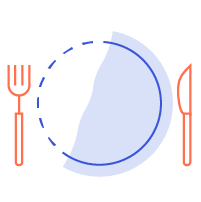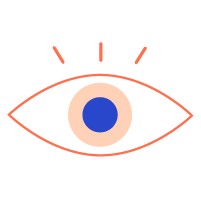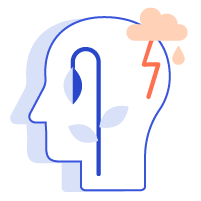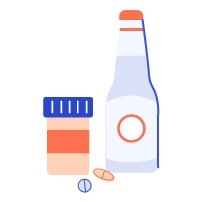Eating for Mental Health: Simple Suggestions for College Students

College is a stressful time for many people. Students’ schedules are constantly shifting as they juggle classes, research papers, work-study programs and new relationships. Maintaining mental wellness amid the chaos can be challenging—and eating habits and patterns can play a part in either maintaining or neglecting mental health.
“Diet is one of those things that can contribute to mental health when there’s a lot going on, either by supporting a healthy body and healthy lifestyle, or, if there’s poor dietary choices, by making some existing stress worse,” said Whitney Linsenmeyer, PhD, RD, LD, spokesperson for the Academy of Nutrition and Dietetics and assistant professor at Saint Louis University’s Doisy College of Health Sciences.
As the American Psychological Association notes, a growing body of research has begun to establish connections between dietary habits and specific psychological problems, although the associations haven’t proven causality. And dietary changes may be effective treatments for mental health conditions: A recent study of young adults with depression indicated that participants’ depression “scores” dropped after adhering to a Mediterranean-style diet for three weeks.
Although more research can better establish the connections between specific diets and mental health, the existing evidence suggests that eating healthfully can be a boon to the mind. For students in a critical transition period, being able to think clearly and manage emotions is important.
“Our food choices as well as our relationship with food can have a strong impact on our ability to manage stress and times of transition. Having a balanced, peaceful relationship with food (e.g., not turning to restricting, bingeing, purging, or other eating disorder behaviors), as well as ensuring we’re getting the nutrients our body needs to function, can be vital,” said Steffanie Grossman, PhD, licensed psychologist and professional advocacy member-at-large for the American College Counseling Association.
Our food choices as well as our relationship with food can have a strong impact on our ability to manage stress and times of transition.
The ability to cope is necessary during transitions, as is the ability to focus, Grossman pointed out. Students need energy to get up every morning, be present in settings with their peers and professors, complete their assignments and engage in class. Food can impact this; not having adequate nutrients or experiencing eating disorder thoughts can take over one’s focus.
“When students have difficulty focusing, they might not do so well in classes,” Grossman said. “That can often cause anxiety. The transition to college is a time that eating disorders frequently develop, because we have significant stressors, frequently have greater access to food (e.g., can be triggering for binges) and have stricter schedules (e.g., may restrict, which in itself is problematic or may lead to a binge).”
In this article, “diet” refers to eating patterns and/or the kinds of foods being consumed habitually. “Diet” does not mean a restrictive course of food that can lead to eating disorders or disordered eating.
What Gets in the Way of College Students Eating in Ways That Are Good for Their Bodies and Minds?
When students go to college, they may face a lot of firsts: the first time away from family; the first time being responsible for attending classes on their own; the first time getting to decide what they want to eat for breakfast, lunch and dinner.
“For many people, if they have access to cafeterias, it can be overwhelming. What do I eat? How much? Are people judging me?” Grossman said. “For others, say if finances are a concern, gaining access to food can also be stressful.”
But having access to a number of food options doesn’t necessarily mean that students will choose the optimal meals for their physical and mental health. Many different factors prevent students from eating the foods that they need.

LACK OF AWARENESS
Students don’t know what constitutes a balanced, flexible, healthy diet or how to listen to their body and eat mindfully. Grossman said that a great workbook for some is “The Intuitive Eating Workbook” by Evelyn Tribole.

LACK OF APPROPRIATE OPTIONS
For some students, food allergies or sensitivities may limit their options in the cafeteria. Foods from various cultures may also not be available. Students who come from families that cook foods not often found in the cafeteria may struggle to adjust or feel isolated.

BUDGET
Not everyone can afford a meal plan. When money is tight, students might resort to cheaper, less healthy food and snacks.

SCHEDULE
With erratic schedules, students may find themselves unable to manage their time, which can increase the risk of disordered eating.

LACK OF SLEEP
The body needs sleep. When students don’t get enough, they might eat or drink whatever is available to try to stay awake.

UNHEALTHY BODY STANDARDS
Pressure to look a certain way may cause students to alter their eating habits and adopt unhealthy patterns. Eating disorders are the most lethal of all mental health disorders, so students should consider seeking help if they are experiencing one.

SUBSTANCE MISUSE
Students using substances such as marijuana or alcohol may binge or intentionally skip meals to consume more alcohol (“drunkorexia”), which can be dangerous to your body and health.
Five Simple Ways College Students Can Improve Their Eating Habits to Maintain Mental Health
Improving diet, your relationship with food, and mental health doesn’t have to involve drastic changes. Grossman and Linsenmeyer suggested simple steps that students can take to alter their eating habits.

Learn about nutrition
See if your school offers academic credit for classes related to health and wellness. Many schools often also have dietitians, who can be helpful in knowing how to develop a peaceful, healthy relationship with food. If not, find out if there are nearby wellness centers or student organizations that offer programming related to nutrition. Many college dining services and dietitians refer to the Department of Agriculture’s food guide (PDF, 297KB) and other tips related to it at ChooseMyPlate.

Look for familiar ingredients
If possible, eating foods that have fewer ingredients and preservatives can be helpful for concentration. (If you noticing you’re becoming obsessive about this, speaking with a dietitian to ensure disordered eating is not developing is important). Linsenmeyer offers this mantra: The shorter the ingredient list, the better. Ingredients should be recognizable words that you can pronounce.

Be mindful of your schedule
Embrace flexibility. While it’s great to have some routine, be prepared for when you’re running short on time or having a late night. Try to carry a snack with you (unless otherwise noted by your dietitian, therapist, etc.), whether it’s for on the go or a midnight pick-me-up.

Practice moderation
Don’t completely restrict yourself from foods you enjoy, unless your medical doctor suggests otherwise. When you try to fully cut out a particular food, telling yourself you can never have it again makes you crave or desire it more and can impact concentration. Allowing yourself to have a treat can help to ensure that you don’t become hyper-focused on what you can and can’t have. Do, however, avoid coffee or other caffeinated drinks close to bedtime. They may disrupt or prevent sleep, which affects mood.

Reach out to a counselor and/or dietitian
If you feel like you’re having a problem with specific eating habits or that your mental health is suffering, reach out to a professional. Many colleges have counseling centers or a school dietitian who can work through those difficulties with you. The transition to college is difficult; it’s normal to need a helping hand.
Do you have a passion for helping college students navigate these important transitions? Learn more about how to become a mental health counselor and how to become a college counselor.

A Menu of Possible Food Options for College Students
Looking for possible meal options? Linsenmeyer shared a number of food suggestions for busy college students. One important thing to note is that eating disorders are prevalent among college campuses, so these tips/suggestions are not hard and set guidelines and are not meant to promote rigid thinking. If you are noticing this occurring in your life (e.g., “good food/bad food” style thinking, strong emotions about food, feeling guilty/shameful after eating), Grossman recommends seeing a therapist to help develop a healthier and peaceful relationship with food.
BREAKFAST: If you’re looking for something sweet in the morning, top off a bowl of oatmeal with fresh fruit. And if you have a hankering for pancakes or French toast, see if your cafeteria has whole wheat options.
DAYTIME SNACK: Candy bars and bags of chips are readily available all over campuses—but, fruit can also be a fantastic choice for fulfilling a sweet tooth. Cut up some apple slices for dipping in peanut butter. Or, if you’re craving a bit of a crunch, unbuttered popcorn with a sprinkle of salt can do the trick.
LUNCH: Cheeseburgers, chicken tenders or pizza slices may sound appetizing, but these options may be best in moderation. A burrito bowl or salad gives you the chance to load up on vegetables with lean proteins. If you’re wanting some extra energy, make it a whole grain wrap.
DINNER: While fried foods have a good chance of making it onto students’ dinner plates, grilled or roasted chicken can be great choices for meat-eaters. Consider sometimes replacing sides like french fries or tater tots with vegetables. And if your cafeteria offers it, a stir-fry is a great way to get in all of those foods mixed into one tasty dish.
EVENING SNACK: If you’re craving ice cream, consider trying Greek yogurt sometimes. Add some blueberries or strawberries for sweetness and texture.
BEVERAGES: Be cautious about sugar-laden energy drinks that can be helpful in the moment but cause an energy crash (not ideal for mid-day classes!). And watch your coffee consumption. Adding milk to coffee is a great way to give it a bit of a kick, as is fruit for flavor in water. As for alcohol, be mindful of your consumption habits. Not only does binge drinking have harmful physical effects on the body, but it can also place you in dangerous or costly situations.
You should consult with your health care provider regarding your dietary requirements prior to enjoying these recipes. They represent only suggestions to improve your eating experience and are not meant to replace a medical opinion. As mentioned throughout, if disordered eating or an eating disorder is present, consider seeking help from a therapist and dietitian (as well as a medical doctor, due to the physical consequences that eating disorders have). This article is not meant to promote rigidity or guidelines.

